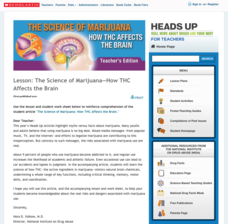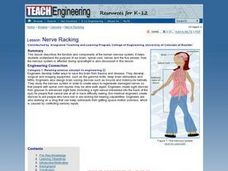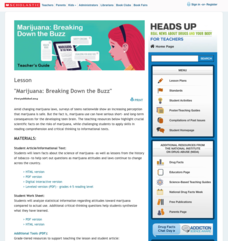Baylor College
Pre-Assessment: The Brain
Break your class in to the general structure and function of the brain. Brainiacs discuss what they know about it and create personalized brain development timelines. They also take a true-false, pre-assessment quiz to get them thinking...
Baylor College
Drugs, Risks and the Nervous System
In cooperative groups, middle schoolers contemplate the probability of 18 different situations occurring. After they make predictions, they compare them to the actual risk factors. This eye-opening exercise demonstrates that the odds of...
National Institute on Drug Abuse
The Brain's Response to Drugs
Marijuana affects the brain differently than inhalants, which have a different effect than opioids. Elementary and middle school classes read about these drugs as well as nicotine, methamphetamine, hallucinogens, and steroids before...
Council for the Curriculum, Examinations and Assessment
Drugs Awareness
The final lesson in a series of 10 focusing on Social, Physical, Emotional, Cognitive and Spiritual (SPECS) health investigates the effects of legal and illegal substances, their risks, and the consequences of their misuse.
PBS
Stories of Painkiller Addiction: The Brain on Autopilot
For some people, the force of addiction can be as biologically compelling as the drive for food or water. High schoolers watch a video segment about Ryan, a recovering addict, and learn more about how opioids and other drugs can affect...
Kenan Fellows
Unit 4: The Brain
Drugs interact with the brain to alter moods, emotions, and behaviors by changing the brain's chemistry, perceptions, and interactions. The final lesson in the Pharmacology unit shows scholars experiments, has them complete four labs,...
Scholastic
The Science of Marijuana—How THC Affects the Brain
Marijuana can affect every part of a user's life—starting with the delicate nervous centers of the brain. An informative article and worksheet prompt teenagers to learn more about how the THC found in most forms of marijuana can...
Discovery Education
Our Brain and Body on Opioids
Use a presentation that explores the world of prescription opioids. Learners look at the way the brain responds to the drugs and the long terms effects opioids have on the brain and body. At the end of the lesson plan, groups create a...
Baylor College
Hormones and Stress
As a more personal part of a unit on brain chemistry, your class discusses stressful situations and the body's response to them. They talk about how, while the reactions are initially helpful, some can be harmful to your health. Finally,...
University of Minnesota
Dendritic Spines Lab
This is your brain on drugs ... literally! Your neuroscientists-in-training examine the evidence of drug use on the human brain and how neurons change their connectivity when altered by drugs. They then work together to create testing...
PBS
Stories of Painkiller Addiction: Contemplating Nature vs. Nurture
Does having an addict in your family make it more likely to become one yourself? Explore the genetic risk factors, as well as the prominent environmental influences, for substance addiction in a instructional activity that encourages...
Florida Department of Health
Understanding the Risk of Substance Abuse Unit
Teenage brains are different! Understanding that the teenage brain is still developing and thus more impacted by substance abuse is the key concept in a three-lesson high school health unit. Participants learn about how the brain and...
Curated OER
Treatment Works!
Students consider the goals of a treatment plan for persons who have had the way they think, feel, or behave changed because of mental illness. PET images are utilized to support the evidence of changes in the activity and functioning of...
Scholastic
Prescription Pain Medication: What You Need to Know
The national epidemic of opioid addiction is making its way into high school populations. Educate the students in your class about the ways prescription opioids can both block pain and deliver large amounts of dopamine that make it very...
Curated OER
Nerve Racking
Fifth graders study the components and function of the nervous system. They investigate how engineers design biomedical equipment to assist the nervous system and explain how the five senses are affected during spaceflight.
Scholastic
Marijuana Facts
Can marijuana really hurt you? Three medical facts and three discussion questions prompt teenagers to consider the ramifications of using marijuana recreationally.
Scholastic
Marijuana: Breaking Down the Buzz
Teenagers get the real information about marijuana use based on the history of tobacco legislation and research. As they read an educational passage about marijuana laws, science, and changing attitudes, they address their preconceptions...
Curated OER
Constant Craving
Students experience the effect of sensory stimulation through a guided visualization. They explore possible genetic relationships between drug addiction and the nervous system by reading and discussing, "Genetic Studies Promise a Path to...
Other popular searches
- Drugs and Brain Chemistry
- Drugs Brain Chemistry
- Brain on Drugs
- Brain and Drugs
- How Drugs Affect the Brain
- Adolescent Brain and Drugs
- Psa Brain on Drugs



















